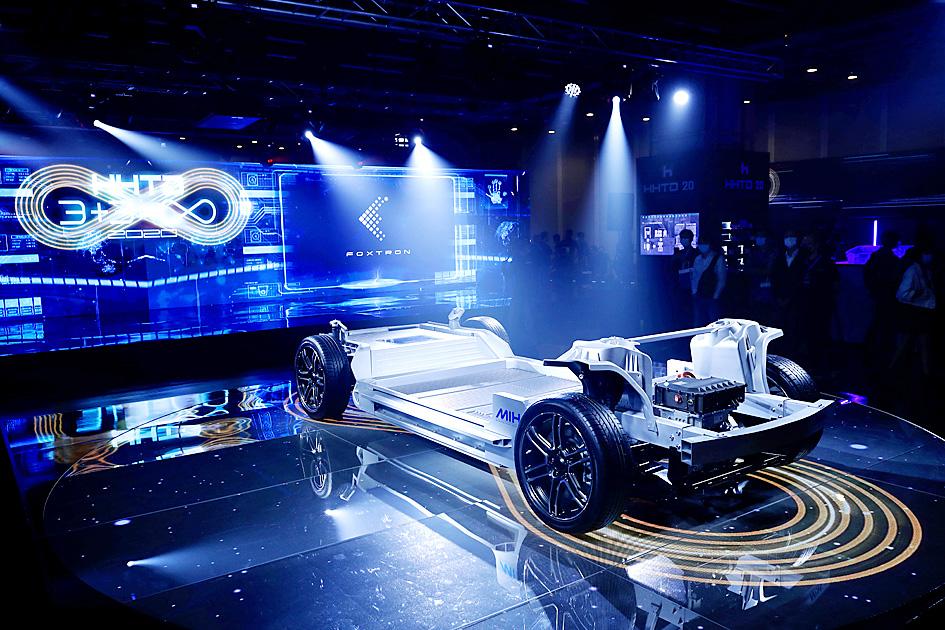Hon Hai Precision Industry Co (鴻海精密) and Chinese start-up Byton Ltd (拜騰) are stepping up cooperation in the development of electric vehicles (EVs), with reports that Hon Hai would station experts at Byton’s factory.
Chinese media on Saturday reported that Hon Hai would send about 100 engineers to Byton’s headquarters in Nanjing next year to help them move up mass production of its electric vehicles.
At a virtual meeting with Byton on Friday, Hon Hai chairman Young Liu (劉揚偉) said the company is not only eyeing the success of Byton, but hoping to capitalize on their partnership to make Nanjing a hub for electric vehicles, the reports said.

Photo: Ritchie B. Tongo, EPA-EFE
Hon Hai, Byton and the Nanjing Development Zone on Jan. 4 signed a strategic cooperation framework agreement to jointly accelerate production of Byton’s first model, the M-Byte, by the first quarter of next year.
“We are pleased to work with Byton to advance the production of the M-Byte. This will allow us to contribute to further growing the electric vehicle industry, a demonstration of our commitment to the transformation of the traditional automotive industry,” Liu said in a statement.
The company has been ambitiously eyeing a share of the electric vehicle market since Liu took office in 2019. It in October last year launched an open platform for electric vehicles for all stakeholders to utilize as they develop functional attributes and systems that would support market growth.
More than 400 companies worldwide have so far participated in the platform and Liu has said that the sector is looking promising for the first half of this year.
Analysts have said that global electric vehicle production would reach 4.58 million this year, up about 60 percent from last year’s 2.86 million.
Among those, 2.09 million are expected to be sold in China, compared with 1.21 million last year.

In Italy’s storied gold-making hubs, jewelers are reworking their designs to trim gold content as they race to blunt the effect of record prices and appeal to shoppers watching their budgets. Gold prices hit a record high on Thursday, surging near US$5,600 an ounce, more than double a year ago as geopolitical concerns and jitters over trade pushed investors toward the safe-haven asset. The rally is putting undue pressure on small artisans as they face mounting demands from customers, including international brands, to produce cheaper items, from signature pieces to wedding rings, according to interviews with four independent jewelers in Italy’s main

Japanese Prime Minister Sanae Takaichi has talked up the benefits of a weaker yen in a campaign speech, adopting a tone at odds with her finance ministry, which has refused to rule out any options to counter excessive foreign exchange volatility. Takaichi later softened her stance, saying she did not have a preference for the yen’s direction. “People say the weak yen is bad right now, but for export industries, it’s a major opportunity,” Takaichi said on Saturday at a rally for Liberal Democratic Party candidate Daishiro Yamagiwa in Kanagawa Prefecture ahead of a snap election on Sunday. “Whether it’s selling food or

CONCERNS: Tech companies investing in AI businesses that purchase their products have raised questions among investors that they are artificially propping up demand Nvidia Corp chief executive officer Jensen Huang (黃仁勳) on Saturday said that the company would be participating in OpenAI’s latest funding round, describing it as potentially “the largest investment we’ve ever made.” “We will invest a great deal of money,” Huang told reporters while visiting Taipei. “I believe in OpenAI. The work that they do is incredible. They’re one of the most consequential companies of our time.” Huang did not say exactly how much Nvidia might contribute, but described the investment as “huge.” “Let Sam announce how much he’s going to raise — it’s for him to decide,” Huang said, referring to OpenAI

The global server market is expected to grow 12.8 percent annually this year, with artificial intelligence (AI) servers projected to account for 16.5 percent, driven by continued investment in AI infrastructure by major cloud service providers (CSPs), market researcher TrendForce Corp (集邦科技) said yesterday. Global AI server shipments this year are expected to increase 28 percent year-on-year to more than 2.7 million units, driven by sustained demand from CSPs and government sovereign cloud projects, TrendForce analyst Frank Kung (龔明德) told the Taipei Times. Demand for GPU-based AI servers, including Nvidia Corp’s GB and Vera Rubin rack systems, is expected to remain high,